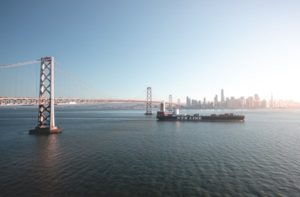 The global maritime transport industry is proposing to form and fund a new non-governmental research & development (R&D) organization to accelerate the decarbonization of shipping.
The global maritime transport industry is proposing to form and fund a new non-governmental research & development (R&D) organization to accelerate the decarbonization of shipping.
The proposal is being made by international shipowner associations Baltic and International Maritime Council, Cruise Lines International Association, Intercargo, Interferry, International Chamber of Shipping, Intertanko, International Tankers Association and World Shipping Council.
The proposal includes core funding from shipping companies worldwide of about US$5 billion over a 10-year period, according to a group statement released December 18.
“The global shipping industry is proposing the establishment of an International Maritime Research and Development Board (IMRB), a non-governmental R&D organisation that would be overseen by IMO Member States,” said the group.
“The IMRB will be financed by shipping companies worldwide via a mandatory R&D contribution of USD 2 per tonne of marine fuel purchased for consumption by shipping companies worldwide, which will generate about USD 5 billion in core funding over a 10-year period.”
This core funding is critical to accelerate the R&D effort required to decarbonize the shipping sector and to catalyze the deployment of commercially viable zero-carbon ships by the early 2030s, it further said.
In a proposal to the International Maritime Organization or IMO, the industry has set out details for governance and funding of the coordinated R&D program, which can be put in place by 2023 via amendments to the existing IMO Convention for the Prevention of Pollution from Ships (MARPOL).
International maritime transport carries around 90% of global trade and is currently responsible for about 2% of the world’s CO2 emissions.
The industry-wide move to accelerate R&D is necessary to ensure the ambitious CO2 reduction targets agreed to by IMO member states in 2018 are met, the group release said.
These ambitious IMO targets include an absolute cut in the sector’s total greenhouse gas emissions of at least 50% by 2050, regardless of trade growth, with full decarbonization shortly after. The 2050 target will require a carbon efficiency improvement of up to 90%, which is incompatible with a continued long-term use of fossil fuels by commercial shipping.
Meeting the IMO GHG reduction goals will require the deployment of new zero-carbon technologies and propulsion systems, such as green hydrogen and ammonia, fuel cells, batteries and synthetic fuels produced from renewable energy sources. These do not yet exist in a form or scale that can be applied to large commercial ships, especially those engaged in trans-oceanic voyages and which are currently dependent on fossil fuels.
The shipping industry’s proposal will be discussed by governments in London at the next meeting of the IMO Marine Environment Protection Committee in March 2020.
Photo by Will Truettner on Unsplash
